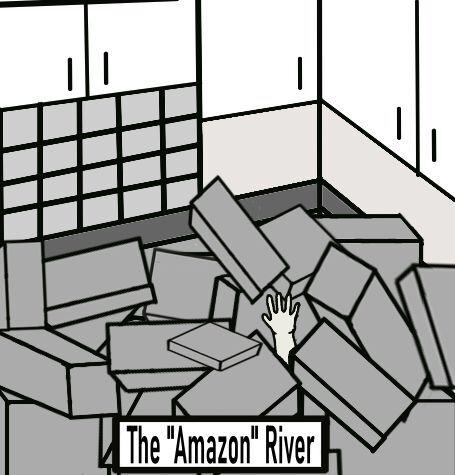Amazon is so convenient and affordable that it is tempting to use it as the “everything store,” especially as a student. Anything can come to your door in a matter of days for a low price. Living on campus without a car and living through a global pandemic has made online shopping through retailers like Amazon more alluring than ever. The only downside is the guilty conscience that may come with the smiling arrow on your box — a result of the many drawbacks the website produces with each purchase.
The poor working conditions for fulfillment center workers and delivery drivers have been widely publicized. They are almost always overworked, underpaid and subject to harsh treatments like timed bathroom breaks. There are also threats of Amazon’s monopolization of the marketplace, threatening small businesses and hurting consumers in the long run.
Next comes a strong lack of environment-friendly shipping options. Whether Amazon is using unrecyclable plastic mailers or cardboard boxes that are easy to recycle, the process of making cardboard creates more carbon dioxide emissions and deforestation, so neither option is environmentally friendly. These are some of the environmental downsides of the packaging alone, not including the waste from the production of all the cheap items Amazon sells.
Last year, when the United States Postal Service was in crisis with mail being delivered later and more unreliably, it was partially brought upon by Amazon and their large number of orders. Now, the University’s mail services are also experiencing delays in their process from the influx of online shopping by students. Community Assistants at some residence halls are working extra hours and there is still a backlog. Many students have to wait days between when they get their delivery email from Amazon to when they can actually pick it up because there are just so many to go through.
Even though I choose not to shop on Amazon as much as possible, I understand there are some times when an Amazon order makes the most sense. There are school and dorm essentials like graphing calculators, notebooks and cleaning supplies where it is not convenient or practical to make the purchase second-hand or through a small business. However, the packages overfilling the mailrooms on campus this semester are not all essentials.
While Jeff Bezos has gotten us used to the idea of being able to buy almost anything for cheap, sometimes, it is good for superfluous goods to be a bit more expensive so we think twice about whether we actually need it. Amazon never provides us that yield sign to check our consumption, which enables excessive spending. This week I lost my favorite vintage sunglasses and so I looked around on reselling sites for a similar pair, all of which were a bit pricey. While I am sure I could have found several pairs on Amazon for under $10, I decided I was fine with the other pair I already own; I don’t need to buy anything. The same process works for clothing, dorm decor, kitchen gadgets, etc.
It may feel like any action like this is meaningless in the context of all the Amazon purchases made across campus and beyond. However, any small step can make a positive impact on somebody. The money you save from avoiding unnecessary purchases will make an impact on your personal finances and create smart spending habits. If you have the resources to shop small, whether from a second-hand seller on Depop, an artist on Etsy or a Black-owned business on Miiriya, you may be helping pay someone’s rent or at least making their day. As an individual consumer, it may be difficult to make Jeff Bezos sweat, but you may be able to improve your life or someone else’s by avoiding purchases on Amazon.















